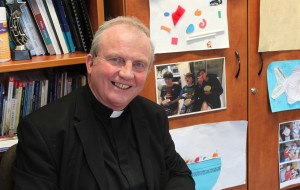
By Sarah Mac Donald - 20 July, 2020
 Bishop Donal McKeown has said he is “always wary” of those who “hanker after a gilded past that they did not know” or who “offer simplistic solutions to modern challenges”.
Bishop Donal McKeown has said he is “always wary” of those who “hanker after a gilded past that they did not know” or who “offer simplistic solutions to modern challenges”.
In his homily reflecting on Sunday’s reading on the wheat and the weeds, the Bishop of Derry said this generation has become aware of the reality of sin within the Church.
He recalled how the narrative that dominated in his youth was that the Church and its personnel were ‘God’s holy anointed’ and that they should never be criticised. “There was evil in the world out there – and we had to defend the purity and honour of who we were.”
However, that way of looking at the Church “blinded us, leaving us unable or unwilling to see the weeds in our midst. It created a Church with a great sense of mission and of generosity. But we struggled to find a place for those who did not fit into our neat categories,” he acknowledged.
The image of the Church he grew up with in the 1950s and 60s was of “a strong and inspiring church” and that “the priests in our parish and those who taught me were impressive men”. But while that “image of ourselves as Church created a pride in our strength and structures” others had “a very different memory” and this too is “part of the truth”.
Referring to Sunday’s Gospel reading, Dr McKeown said the reality of sin in the Church is not intended by Jesus as a depressing message. “God can still use a humbled contrite Church to bear great fruit. Those who have made bad decisions in earlier life can often become great saints, not despite their mistakes but precisely because of them. In their sins they have discovered the power, not of their righteousness but of God’s mercy. That is the source of our hope and confidence.”
He said the Gospel parable also offered insights with which to speak to society as political discourse has often been reduced to simplistic solutions. “Complex issues have been reduced to black versus white, repressive versus liberal options. We know from recent decades that what has been defined as progress may well have apparently benefited some – but that others have paid a price.”
While there were many weeds in older ways of looking at marriage and family, the Bishop of Derry highlighted that if committed relationships and fidelity are downplayed, “allegedly in the glorious interests of human freedom, there is a huge cost to be paid by the young and the fragile”.
He added, “The Holy Grail of ‘the right to choose’ comes at a great cost to those whose rights are ignored. In Church and outside, the strong can often look after their own interests rather than the Common Good or the defence of the weak.”
Speaking in St Eugene’s Cathedral on Sunday, Bishop McKeown stressed that modern secular dogmas can be “as harsh and blind as anything that they condemn in a religious past or present. Then and now, there are none so blind as the dogmatists who do not want to see the uncomfortable truth”.
He said Christ’s disciples have a prophetic key role to play in the world of political decision-making.
“Faith is not just for the few or the pews. Faith-based schooling exists not just to teach religious content but to promote this uncomfortable counter-cultural vision of the world. Faith-based schools teach about God so that they can be centres where ‘a specific concept of the world, the human person and of history is developed and conveyed’ he said quoting from the 1977 Vatican document, ‘The Catholic School’.
He added, “When our education system subjugates that transcendental vision and gives priority to market forces, we are – as Pope Francis has said – wasting our time. It is important to acquire knowledge. But knowledge without wisdom can be very stupid and destructive. It sows the seeds of self-serving, poisonous weeds in our society.”
Bishop McKeown’s comments follow a recent warning by Vatican diplomat, Archbishop Ivan Jurkovic, that the Covid-19 pandemic’s closure of schools will deepen injustices and inequalities in education.
In an address to the UN Human Rights Council in Geneva, Archbishop Jurkovic, the Vatican’s Permanent Observer to the UN, said education remained a fundamental enabler for sustainable development.
He highlighted that not all families were equipped with the IT skills to accommodate home schooling and that many parents had been under pressure trying to juggle working from home with home-schooling.
Live streaming of Masses and Services from churches in Ireland and the UK can be found here: http://churchservices.tv